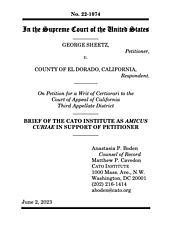Mr. Sheetz challenged the fee’s constitutionality. The superior court rejected his suit. Then, the California Court of Appeal upheld that denial. Following California precedent, it held that the U.S. Constitution’s protections against eminent domain do not require any heightened scrutiny for land-use fees that are imposed legislatively (such as through the County’s ordinances), rather than on an individualized, ad hoc basis. The California Supreme Court declined to review the case.
Cato filed an amicus brief asking the U.S. Supreme Court to review the decision. The Constitution requires just compensation for any taking of private property. The Court has already held that governments cannot impose conditions on permit developments without there being an “essential nexus” to a “valid governmental purpose.” The heightened judicial scrutiny that applies is “rough proportionality”: the government has to “make some sort of individualized determination that the required dedication is related both in nature and extent to the impact of the proposed development.” The Court has also held that this scrutiny applies to monetary exactions, like the fees Mr. Sheetz faces.
Contrary to California’s rule, the Court’s cases—and the Constitution’s protections—do not depend on how governments impose fees. From the property owner’s point of view, a taking is a taking no matter how it comes about. California’s “legislative” exception has no constitutional foundation, misreads the Court’s opinions, and misunderstands the political dynamics of takings. While California thinks the legislative process is all the protection property owners need, the whole point of constitutional rights is protection from normal politics. The Court should take Mr. Sheetz’s case and do away with California’s unconstitutional exception.


